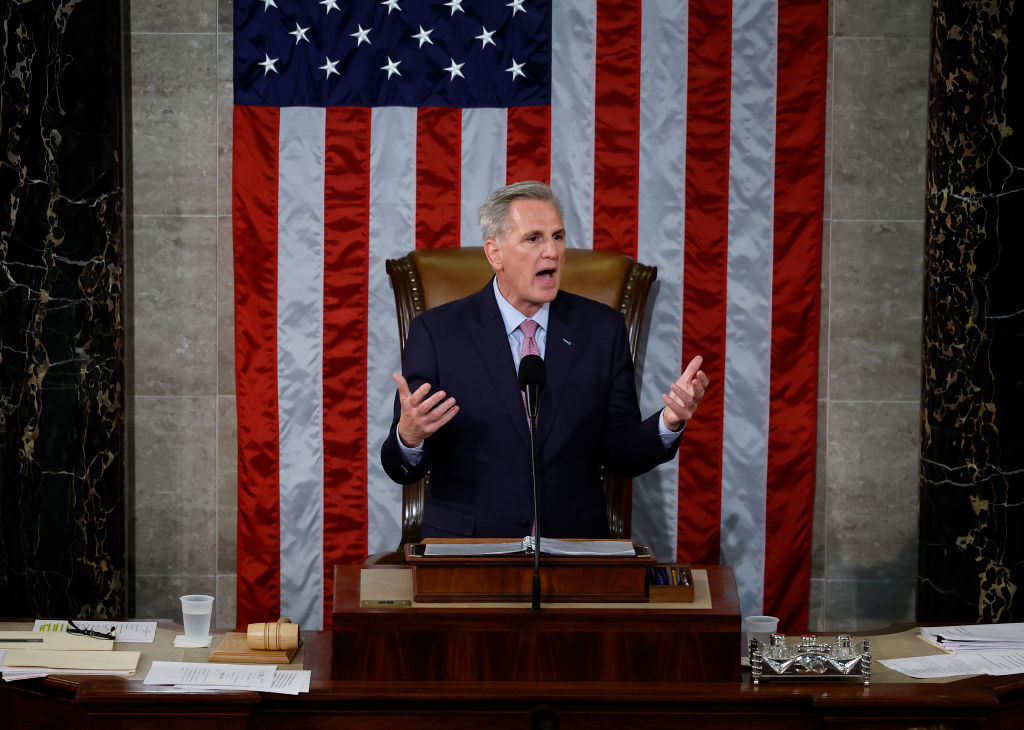
After many twists and turns, and much spectacle, Kevin McCarthy (R-Calif.) is now Speaker of the House of Representatives, brought into power after ceding to extreme demands from the right-wing of the Republican Party.
This session of Congress was never going to be a blockbuster one for climate policy. But the chaotic process of electing McCarthy portends ongoing congressional dysfunction that could nix any potential bipartisan breakthroughs on issues like energy permitting reform and the funding of climate-linked disaster recovery efforts.
To understand these challenges, consider what the 20 Republican members of Congress who opposed McCarthy’s bid want: more power to influence legislation in the Republican conference, and to show their constituents, particularly the GOP loyalists who vote in primaries, that they are taking a stand for their stubborn brand of the Republican Party.
A version of this story first appeared in the Climate is Everything newsletter. To sign up, click here.
Though climate wasn’t raised loudly by the anti-McCarthy contingent over the past week, that group includes many of Congress’s most vocal opponents of climate policy. A brief scan shows many of the representatives vocally defending the oil and gas industry, questioning the science of climate change, and voting against anything with a green tinge. In the midst of the speaker battle, one representative even criticized McCarthy for not doing enough to stop climate policy. “He did not whip votes against the phony infrastructure bill which focused more on climate change than roads and bridges,” Rep. Bob Good, a Virginia Republican who opposed McCarthy, wrote in a December op-ed in the Richmond Times-Dispatch.
No one expected the new Congress to spend more on climate change. Indeed, some Republicans may try to undo the Inflation Reduction Act (though such an effort would be dead on arrival in the Democratic Senate). Still, the focus on spending underscores the challenges Congress might face when climate-linked disasters arise. Funding recovery efforts has drawn ire from many Republicans in recent years, and it’s safe to assume that such vocal opposition will continue. Now, though, right-wing Republicans will have new tools to pressure McCarthy that they won as concession in their hard fought battle to keep him from becoming speaker.
Some Democrats and Republicans, however, remain optimistic that there are a few areas where the new Congress can make some headway. Rep. Kathy Castor, the Florida Democrat who led the House Climate Crisis Committee before Republicans disbanded it, told me in December that she thought climate-related support for farmers, carbon capture, and nuclear power were all areas where there is an opportunity for bipartisan compromise.
Last summer, a committee of Congressional Republicans convened by McCarthy to study energy and climate policy rolled out a series of recommendations for how Republicans might approach the issue. Some of those policies, like one proposal to immediately approve the Keystone XL pipeline, could never make it past a divided Congress. Others—think of policies advancing research and development—might, at least in theory, still have potential.
Rich Powell, the executive director of ClearPath, which promotes conservative climate solutions, suggested that bipartisan concern about China could prompt Congress to look at clean energy from a competitiveness perspective. (The House has already established a bipartisan committee to tackle threats from China.) Members of both parties have called for a reworking of permitting rules to allow for faster development of energy infrastructure—including clean energy—but were unable to reach consensus in the last Congress. Now, says Powell, “We just have to figure out what the right formulation is now that everybody, more or less, agrees there’s a problem.”
More Must-Reads from TIME
- How Donald Trump Won
- The Best Inventions of 2024
- Why Sleep Is the Key to Living Longer
- Robert Zemeckis Just Wants to Move You
- How to Break 8 Toxic Communication Habits
- Nicola Coughlan Bet on Herself—And Won
- Why Vinegar Is So Good for You
- Meet TIME's Newest Class of Next Generation Leaders
Write to Justin Worland at justin.worland@time.com